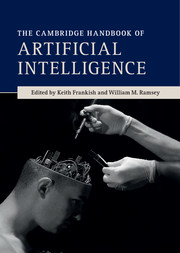2 - Philosophical foundations
Published online by Cambridge University Press: 05 July 2014
Summary
Introduction
Much work in artificial intelligence has built on concepts and theories developed by philosophers and logicians. This chapter introduces this foundational work, surveying different conceptions of AI, the philosophical dream of mechanizing human reasoning, the conceptual roots of AI, and the major theories of mind that have underpinned different strands of AI research.
What is AI?
That is itself a deep philosophical question, and attempts to systematically answer it fall within the foundations of AI as a rich topic for analysis and debate. Nonetheless, a provisional answer can be given: AI is the field devoted to building artifacts capable of displaying, in controlled, well-understood environments, and over sustained periods of time, behaviors that we consider to be intelligent, or more generally, behaviors that we take to be at the heart of what it is to have a mind. Of course this answer gives rise to further questions, most notably, what exactly constitutes intelligent behavior, what it is to have a mind, and how humans actually manage to behave intelligently. The last question is empirical; it is for psychology and cognitive science to answer. It is particularly pertinent, however, because any insight into human thought might help us to build machines that work similarly. Indeed, as will emerge in this article, AI and cognitive science have developed along parallel and tightly interwoven paths; their stories cannot be told separately. The second question, the one that asks what is the mark of the mental, is philosophical. AI has lent significant urgency to it, and conversely, we will see that careful philosophical contemplation of this question has influenced the course of AI itself. Finally, the first challenge, that of specifying precisely what is to count as intelligent behavior, has traditionally been met by proposing particular behavioral tests whose successful passing would signify the presence of intelligence.
Keywords
Information
- Type
- Chapter
- Information
- The Cambridge Handbook of Artificial Intelligence , pp. 34 - 63Publisher: Cambridge University PressPrint publication year: 2014
References
Accessibility standard: Unknown
Why this information is here
This section outlines the accessibility features of this content - including support for screen readers, full keyboard navigation and high-contrast display options. This may not be relevant for you.Accessibility Information
- 19
- Cited by
